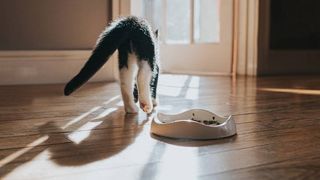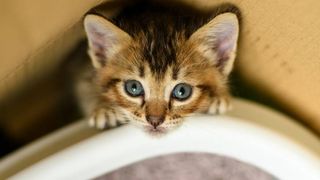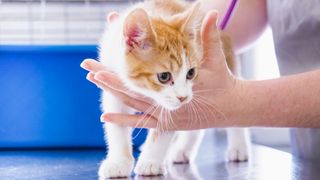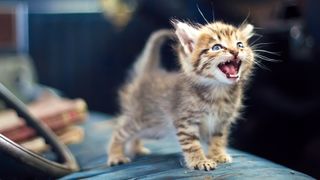Kitten not eating: A vet's guide to causes and solutions
Is your kitten not eating? Follow our vet’s tips to help them regain their appetite

A kitten not eating can be due to a range of reasons - from stress to illness, or even a change in diet. If your kitten goes without food for more than 24 hours, it could be a sign of a more serious underlying issue and require veterinary attention.
But how much food should a kitten eat? Well, because kittens have very small stomachs, they require regular meals to maintain their health and growth. Generally, a healthy kitten should eat at least three to four times a day. However, if a kitten goes without eating for an extended period of time, it can lead to dehydration, malnourishment, and other health complications.
It's important to watch your kitten for changes in their normal behavior and to seek professional advice if you're concerned. Perhaps they’ve stopped playing with their best cat toys and seem more sleepy than usual? Or are they pacing or howling when they wouldn’t usually? It’s very important to monitor your kitten for any signs of lethargy or symptoms such as vomiting or diarrhea when they stop eating.
Your veterinarian can help you to find out why your kitten isn’t eating. They will perform a physical examination and may even need to run some blood or stool tests. Vet Elizabeth Racine shares her thoughts below on why your kitten may have stopped eating and her top tips to get them back to the bowl.

Dr Elizabeth Racine graduated in 2017 as a Doctor of Veterinary Medicine. She now specializes in veterinary behavior, nutrition, and internal medicine. Dr Racine also works as a freelance writer, writing for major companies in the industry such as the American Kennel Club.
Why would a kitten suddenly stop eating?
There can be many reasons why a kitten would stop eating and it can be hard to distinguish one cause from another. Your kitten may have stopped eating due to:
- Dislike of the flavor or texture of the food
- Stress
- Nausea
- Parasites
- Gastrointestinal foreign body or obstruction
- Upper respiratory infection
- Other illness making your kitten feel unwell
This is why it is very important to monitor your kitten’s eating habits and take her to a veterinarian if those habits change suddenly. A sudden change in appetite can be a sign of an underlying illness that needs veterinary attention.
Our guide to preparing for your kitten's first vet visit will help ensure things are as stress-free as possible for your little one.

What to do if your kitten won’t eat
If your kitten has suddenly stopped eating the first thing you can do is try to entice her to eat. Sometimes a kitten will stop eating simply because she dislikes the food or the environment she is being fed in, and making some adjustments can help get your kitten eating again.
Try these kitten feeding tips to get your beloved bundle of fluff eating again:
1. Try offering different foods
Try offering a mix of wet and dry food, including different flavors and textures – to see if this will entice your kitten to eat. Some cats love pate food, while others will only eat if their food has gravy! You can also try warming the food up in the microwave, but be very careful not to make it too hot and always check it with your finger to ensure there aren’t any hot spots, which could burn your kitten’s mouth.
Check out these foods kittens can eat besides cat food if you want to try and tempt their tastebuds with a tasty alternative.
2. Feed your kitten in a quiet space
Consider feeding your kitten alone in a quiet room or leaving food out overnight. Some cats that are very nervous or shy may not eat with people or other animals around. You may find that once everyone is asleep and the house is quiet, she will venture out to eat by herself.
3. Ensure their food bowl is clean
Leftover food bits can quickly grow bacteria and mold, making for a very unappetizing meal! Use a bowl that is wide and shallow so it will be easy for your kitten to access, and wash it with dish soap and warm water after each meal.
When to worry about a kitten not eating
According to MSD Veterinary Manual, “Proper nutrition is important throughout a cat’s life and is especially critical during kittenhood. Growing kittens need more calories, fat, protein, vitamins, and minerals to meet their needs for rapid growth and development”.
When it comes to the question of how often should I feed my kitten, the answer is multiple times per day. It's vital that you contact your vet if your kitten does not eat within 24 hours, even if water is being consumed. If your kitten is under 6 weeks old and shows signs of illness, alongside stopping eating, contact your veterinarian immediately.
This is especially important if your kitten has any other symptoms of illness, such as vomiting, diarrhea, lethargy, or abdominal pain.
Very young kittens, such as those under 6 weeks of age, should see a veterinarian even sooner because they are at risk for hypoglycemia, or low blood sugar, if they do not eat regularly.
Signs of hypoglycemia include loss of appetite, weakness, stumbling, falling over, disorientation, vomiting, diarrhea, seizures, and death. If you suspect your kitten may be hypoglycemic, rub some karo syrup, honey, or even maple syrup onto your kitten’s gums and take her to a veterinarian immediately.

Diagnosing your kitten
If your kitten has not been eating, your veterinarian will first perform a full physical examination, including listening to your kitten’s heart and lungs and palpating your kitten’s abdomen to feel for any abnormalities. Your veterinarian will likely also want to perform some diagnostic tests such as blood work, radiographs (x-rays) of your kitten’s abdomen, or evaluation of a fecal sample to rule out parasites.
This will help your veterinarian rule out common causes for your kitten to stop eating. If an underlying cause for your kitten’s loss of appetite is identified, your veterinarian will prescribe an appropriate treatment plan to help get your kitten back on track.
Sometimes, no underlying cause is identified to explain your kitten’s change in appetite. In this case, your veterinarian may prescribe medication to address the symptoms. This may include a medication to alleviate nausea, an appetite stimulant, an antacid, or even intravenous (IV) or subcutaneous (SQ) fluids to help keep your kitten hydrated. Be sure to follow your veterinarian’s instructions closely, and let your vet know if your kitten does not improve on the medications.

Treating your kitten at home
Although it may be tempting to try home remedies or over-the-counter medications for your kitten, this is not a good idea. Many of these “treatments” are unhelpful at best and toxic at worst. Your kitten is fragile and cannot tolerate new supplements at this time. Many over-the-counter and other human medications are also toxic to cats and can be very dangerous to your kitten. In general, you should never use a home remedy or medication without first consulting your veterinarian.
With your veterinarian’s help – and maybe a little trial and error – you’ll hopefully see your kitten back at the food dish in no time. Remember that too many diet changes can cause an upset stomach, so transition gradually if you're going to be changing cat food. Be sure to keep an eye on your kitten’s appetite, and see your veterinarian if any further episodes of not eating occur. Most importantly, enjoy all the fun there is to be had during kittenhood!
PetsRadar Newsletter
Get the best advice, tips and top tech for your beloved Pets
Dr. Elizabeth Racine is a small animal general practice veterinarian covering all things pet health and wellness. Her special interests include veterinary behavior, nutrition, and internal medicine. As a freelance writer, Dr. Racine has written content for major companies in the industry such as the American Kennel Club, Merck Animal Health, Bayer PetBasics, Elanco, and CareCredit. In her free time, Dr. Racine enjoys playing trampoline dodgeball, hiking with her beagle Dasher, and spending time with her three mischievous cats. Dr. Racine can be found at www.theveterinarywriter.com and at https://www.linkedin.com/in/eracinedvm/
- Caroline WilkinsonCertified Animal Behaviourist
- Dr. Diana Hasler BVM&S MRCVS
